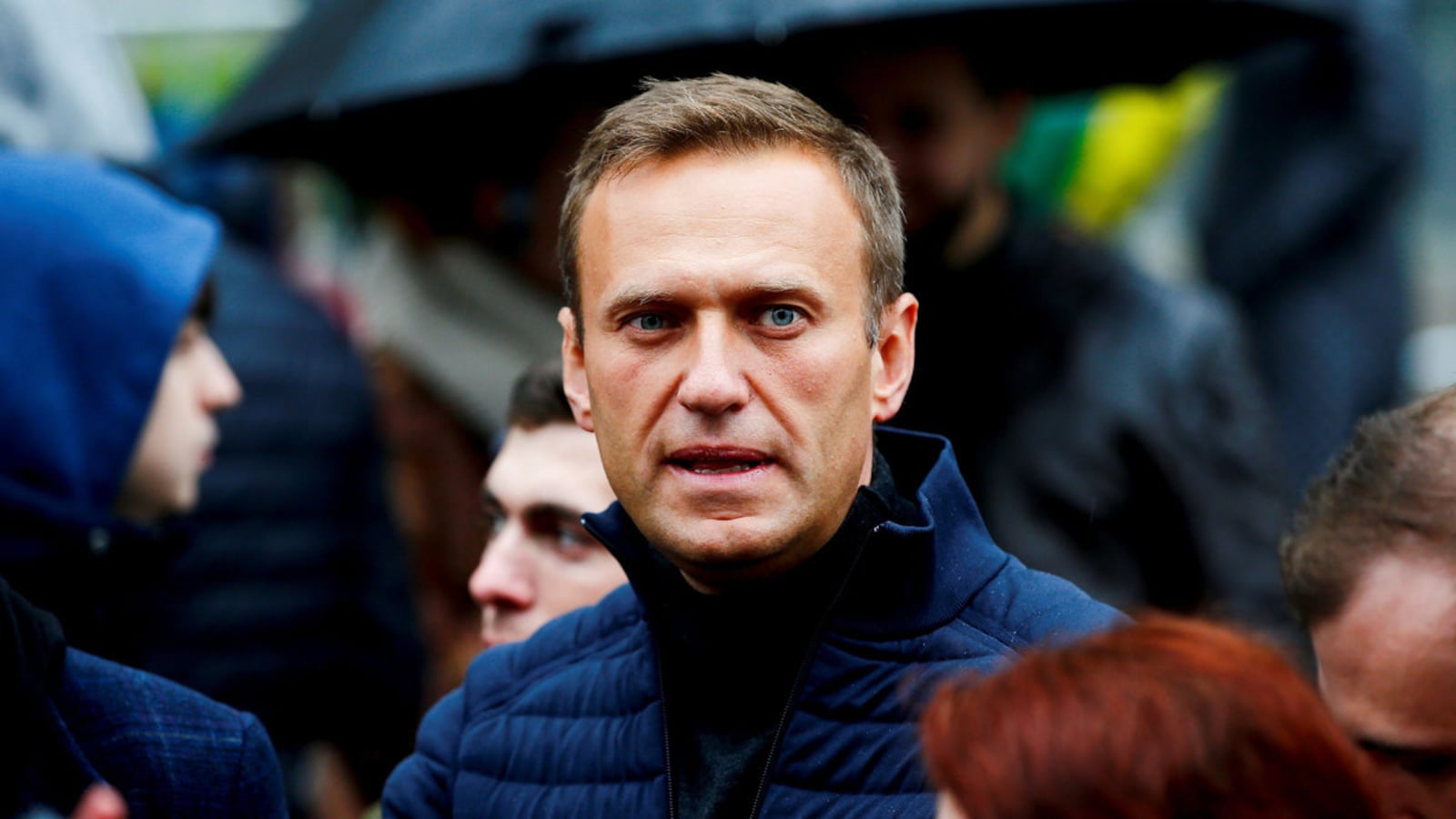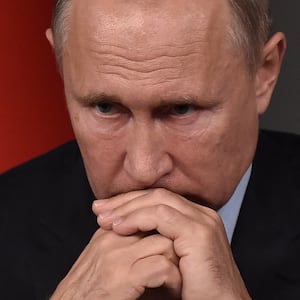U.S. officials are weighing whether to implement sanctions against Russian individuals and groups connected to the poisoning and imprisonment of Russian opposition leader Alexei Navalny, according to three individuals familiar with the matter.
Hitting Russia with fresh sanctions over Navalny would be a clear break from how former President Donald Trump handled the matter. In private and in public, he doubted that the Kremlin had anything to do at all with the attempt on Navalny’s life.
The discussions about levying sanctions are part of a broader conversation between officials at the State and Treasury departments, as well as the National Security Council, about how and whether to respond to recent Russian malign activities, including the Solarwinds cyberhack, bounties put on U.S. troops in Afghanistan, and Russian interference in the 2020 presidential election, those sources said.
President Joe Biden, who recently spoke with President Vladimir Putin about Navalny, has asked Director of National Intelligence Avril Haines to conduct an intelligence assessment of all four incidents. The move to sanction the Russians would likely come after that assessment is returned, sources said. The sanctions would also have to be closely coordinated with European allies to ensure maximum enforcement. The European Union has said it will hold off on imposing sanctions on Russia if it releases Navalny from prison within 30 days.
It’s not clear exactly how the Biden team will implement the sanctions or what legal remedy they will use, though three former officials who spoke to The Daily Beast said the administration would likely use the Magnitsky Act.
“Just as we engage Russia in ways that advance American interests, like seeking a five-year extension to New START, we remain clear-eyed about the challenges that Russia poses,” said National Security Council Spokesperson Emily Horne, referring to the nuclear arms reduction treaty with Russia that the Biden administration recently agreed to extend for another five years. “Even as we work with Russia to advance U.S. interests, so too will we work to hold Russia to account for its reckless and adversarial actions.”
The Magnitsky Act—a 2012 law, passed after the suspicious death of Russian attorney Sergei Magnitsky in a Moscow prison, which allows the government to sanction individuals allegedly involved in human rights abuses abroad—is most commonly understood as a tool for punishing assassins and organized crime bosses. But given Navalny’s detention in retaliation for anti-corruption investigations, those read in on the administration’s stance on Russia say that it could almost certainly be used in retaliation for his imprisonment.
“Navalny is being falsely imprisoned for exposing Russia’s elite as kleptocrats and gangsters,” one State Department official said, summing up the idea. “It follows that you would want to prevent those same kleptocrats and gangsters from enjoying the benefits of participating in the global marketplace.”
Former national security officials argued that the Navalny situation should be viewed separately from the Solarwinds hack and the Russian bounties—that the administration should evaluate and consider ramifications and policy recommendations for each in silos. The fear, former officials said, is that the Biden team will take on the strategy of the Trump administration and implement policy because of outside pressure—demands from Capitol Hill or elsewhere that the administration punish Russia— rather than considering how each move to punish Russia could frame the relationship over the coming years.
“Implementing a U.S. sanctions package for the attempted assassination of Navalny is important, not only to try and change Russia’s bad behavior, but also to reinforce the global norm against chemical weapons use,” said Ryan Tully, the former senior director for Europe and Russian affairs at the National Security Council. “A U.S. sanctions package… should send the right message. This isn’t likely to change the Kremlin’s behavior, however.”
Tully said the sanctions package should fully implement the menu of options under the Chemical and Biological Warfare (CBW) Act, along with targeted designations of individuals responsible for the attack using the Magnitsky and Executive Order 13382, and request a challenge inspection of Russia chemical weapons facilities by the Organization for the Prohibition of Chemical Weapons.
Navalny has been the most prominent domestic critic of Putin for several years but support for the anti-corruption campaigner surged following the failed assassination attempt.
Putin’s decision to have him arrested at the airport as he returned from life-saving treatment in Germany sparked major protests, which are expected to continue on Sunday. Putin was forced to address the corruption allegations against him, and he has responded to the popular outcry with a crackdown on freedom of expression.
One of the protesters who was snatched off the streets and jailed for two days this week told The Daily Beast that he had been treated like an “animal.” He fears protests from within Russia will soon be extinguished.
“It was outrageously brutal, unlawful,” said Denis Mayorov. “Now I can see it clearly: Power chooses mass arrests. I don’t think there is any way forward for change.”
According to two former senior officials, the Trump administration was working on a sanctions package to respond to the August poisoning of Navalny and other hostile Russian behavior. But officials said as the focus in the White House turned toward the election, interest in implementing the president’s plan began to wane.
While the Trump administration did hit Russian individuals and organizations with more than 15 rounds of sanctions—including repeated penalties for the poison attack on former Soviet spy Sergei Skripal—Navalny himself had a less-than-sympathetic ear in the Trump Oval Office.
According to two people who spoke to the former U.S. president during the final year of his term, Trump was repeatedly dismissive of Navalny during White House discussions, and had to be reminded multiple times of who he even was. “It was often apparent that the president didn’t really care,” said one former senior administration official. Another person who spoke to Trump about Navalny late last year recounted how the then-president once mentioned that “even if” the Kremlin had been involved, it was not worth worsening his relationship with the Russian government heading into a second term. (Trump, of course, lost to Joe Biden and did not secure that second term in 2020.)
Up until the end of his administration, Trump had yet to buy that the Russian government was behind the attempted murder of Navalny, and largely viewed Democratic calls for Trump to take the poisoning more seriously as yet another effort by his enemies to try to troll him with Trump-Russia innuendo and to accuse him of being naively deferential to Putin, the sources said.
It quickly got to the point where several senior officials deemed it not worth the effort to try to convince him to take the matter seriously, or to even highlight to him the likelihood of Kremlin involvement.
In September, Trump publicly expressed skepticism about pointing the finger at Russia, telling reporters at the White House, “I don’t know what exactly happened. I think it’s tragic, it’s terrible, it shouldn’t happen. We haven’t had any proof yet, but we will take a look.”
By this month, however, Trump could find at least one reason to truly appreciate Navalny. In the aftermath of the Jan. 6 MAGA riot at the U.S. Capitol that Trump instigated and following his resulting ban from Twitter, Navalny denounced the social media company's decision to boot the Republican president off of the platform as “an unacceptable act of censorship.” According to a person with direct knowledge of the matter, Navalny’s tweets and a couple news articles detailing Navalny’s objections were printed and presented to Trump in a packet of papers showing different politicians and public figures condemning the banning of @realDonaldTrump.
—with additional reporting by Anna Nemtsova in Moscow







